Protypotherium
Protypotherium is an extinct genus of notoungulate mammals native to South America during the Miocene epoch. A number of closely related animals date back further, to the Paleocene. Fossils of Protypotherium have been found in the Deseadan Fray Bentos Formation of Uruguay, Muyu Huasi Formation of Bolivia, Cura-Mallín and Río Frías Formations of Chile,[1] and Santa Cruz, Salicas,[2] Ituzaingó,[3] Cerro Bandera,[4] Chichinales, Sarmiento and Collón Curá Formations of Argentina.[5][6]
| Protypotherium | |
|---|---|
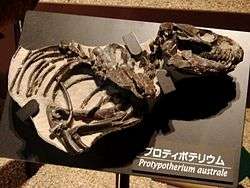 | |
| Fossil of P. australe. Exhibit in the National Museum of Nature and Science, Tokyo, Japan | |
| Scientific classification | |
| Kingdom: | |
| Phylum: | |
| Class: | |
| Order: | |
| Suborder: | |
| Family: | |
| Genus: | †Protypotherium Ameghino 1882 |
| Type species | |
| Protypotherium australe Moreno 1882 | |
| Species | |
| Synonyms | |
| |
Description
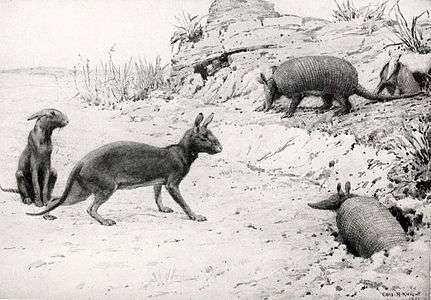
Protypotherium was slightly larger than a rabbit, measuring about 40 centimetres (1.3 ft) in length. The body and legs as well as the tail of this animal were relatively long, while its neck was short. It probably resembled a rodent, possessing slender limbs with clawed feet. Its rat-like skull contained a set of 44 unspecialized teeth.[7]
From the shape of its claws, Protypotherium would have been adept at digging and likely took over the burrows of other animals.
Species
The following species of Protypotherium have been described:[5]
- P. altum Ameghino 1891
- P. antiquum Ameghino 1882
- P. attenuatum Ameghino 1887
- P. australe Moreno 1882
- P. claudum Ameghino 1889
- P. colloncurensis Vera et al. 2017[6]
- P. diastematum Ameghino 1891
- P. distinctum Cabrera & Kraglievich 1931
- P. endiadys Roth 1898
- P. minutum Cabrera & Kraglievich 1931
- P. praerutilum Ameghino 1887
- P. sinclairi Kramarz et al. 2015[4]
- P. concepcionensis Solórzano et al. 2019
Gallery
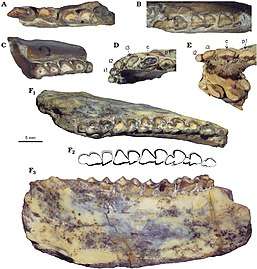 Lower dentition of P. endiadys
Lower dentition of P. endiadys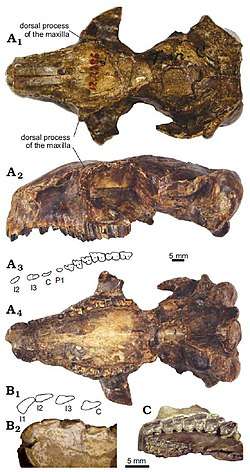 Skull of P. endiadys
Skull of P. endiadys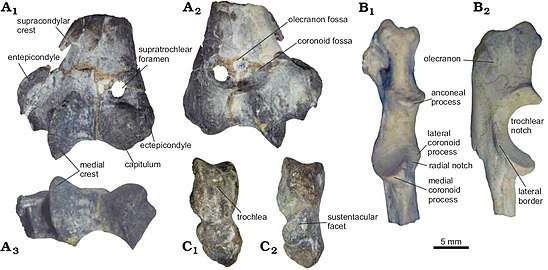 Post-cranial bones of P. endiadys
Post-cranial bones of P. endiadys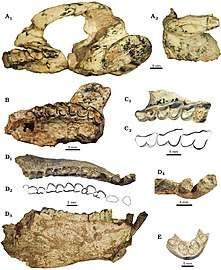 Lower and upper dentition of P. colloncurensis
Lower and upper dentition of P. colloncurensis
References
- Bostelmann et al., 2012, p.44
- Brandoni et al., 2012, p.7
- Cione et al., 2000, p.208
- Kramarz et al., 2015, p.587
- Protypotherium at Fossilworks.org
- Vera et al., 2017, p.855
- Palmer, D., ed. (1999). The Marshall Illustrated Encyclopedia of Dinosaurs and Prehistoric Animals. London: Marshall Editions. p. 251. ISBN 1-84028-152-9.
Bibliography
- Bostelmann, J.E. et al. 2012. The Alto Río Cisnes Fossil Fauna (Río Frías Formation, Early-Middle Miocene, Friasian SALMA): A keystone and paradigmatic vertebrate assemblage of the South American Fossil Record, 44–45. III Simposio Paleontología en Chile. Accessed 2019-03-13.
- Brandoni, Diego; Gabriela I. Schmidt; Adriana M. Candela; Jorge I. Noriega; Ernesto Brunetto, and Lucas E. Fiorelli. 2012. Mammals from the Salicas Formation (Late Miocene), La Rioja Province, Northwestern Argentina: Paleobiogeography, age and paleoenvironment. Ameghiniana 49. 1–13. Accessed 2019-03-13.
- Cione, A.L.; M.M. Azpelicueta; M. Bond; A.A. Carlini; J.R. Casciotta; M.A. Cozzuol; M. Fuente; Z. Gasparini, and F.J. Goin, J. Noriega, G.J. Scillato Yané, L. Soibelzon, E.P. Tonni, D. Verzi, and M.G. Vucetich. 2000. Miocene vertebrates from Entre Rios province, eastern Argentina. Serie Correlación Geológica 14. 191–237. Accessed 2019-03-13.
- Kramarz, Alejandro G.; Bond, Mariano; Arnal, Michelle (December 2015). "Systematic Description of Three New Mammals (Notoungulata and Rodentia) from the Early Miocene Cerro Bandera Formation, Northern Patagonia, Argentina" (PDF). Ameghiniana. 52 (6): 585–597. doi:10.5710/AMGH.27.06.2015.2906.
- Vera, Bárbara Soledad; Reguero, Marcelo Alfredo; Gonzalez, Laureano Raul (December 2017). "The Interatheriinae notoungulates from the middle Miocene Collón Curá Formation in Argentina". Acta Palaeontologica Polonica. 62. doi:10.4202/app.00373.2017. hdl:11336/56874.
- Solórzano, Andrés; Encinas, Alfonso; Bobe, René; Maximiliano, Reyes; Carrasco, Gabriel (December 2019). "The Early to late Middle Miocene mammalian assemblages from the Cura-Mallín Formation, at Lonquimay, southern Central Andes, Chile (~38°S): Biogeographical and paleoenvironmental implications". Journal of South American Earth Sciences. 96: 102319. doi:10.1016/j.jsames.2019.102319.